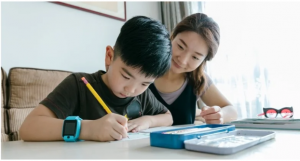Your child may face challenges understanding the complex nature of science concepts required to answer open-ended questions during their PSLE exams. This challenge is not specific to your child. I mean, I remember how we used to get tensed before each science exam – do you remember the last-minute cramming we all did?
Over the years that I have tutored students on science-related topics, I have noted down the following tips that your child may benefit from:

Tip 1: Help Your Child to Create a Content Map
I know, the phrase ‘content map’ sounds more intimidating than science experiments, right? Don’t worry; the concept is straightforward.
Imagine you are heading to a new location that is unknown to you. What will you do? These days, we usually take out our phone and just use the GPS to locate the unknown location!
And the GPS map will tell you the landmarks to look out for, the street names, or even where to find the train station. Simple and easy right?
A content map works similarly.
A revision content map is a simplified version of all the topics your child expects to be tested on in the science PSLE exam. When creating a content map, you will need to sit with your child and go through the science topics, and the student will write a simplified version of the content, complete with diagrams whenever necessary.
Some people call them short notes, others may even call them cheat sheets but it doesn’t really matter what you call it as long as your child is able to learn using the content map.
However, you need to consider that sometimes even you are not too familiar with the topics at hand, so constructing a content map with your child is an activity that requires patience and time. But the sacrifice you make to help your child out is worth every ounce of energy and you will be very happy once your child does really well in their exams.
Tip 2: Help Your Child Develop a Strategy for Answering Open-Ended Questions

Adults love to use this term, ‘strategy’. Sometimes, even teachers in school use this word often. You’ve probably had to sit in an eight-hour meeting creating a strategy for various activities at work. Or you have had to devise a method to achieve one or two things in your life.
The same goes for helping your child pass their PSLE science open-ended questions. A strategy is like an action plan that your child can follow when answering questions. When your child has a plan for answering the questions, they will have a reference point when in the science exam.
A good strategy will also help your child efficiently synthesize the exam question and answer exactly what they have been asked. So how does a good strategy look like, you ask?
Here are some tips:
• Before attempting any PSLE open-ended science question, your child should identify the key information required.
What topic does the question require the student to refer to? Which particular sub-topics contain the answers to the problem? And what exactly about the subtopic is the question evaluating?
The trick to helping your child internalize the strategy for answering open-ended science questions in the PSLE exams is to guide them as they practice with numerous past PSLE exam papers.
• Highlight the main topic with a marker pen.
Highlighting the main topic with a marker pen helps the main issue stand out so that it’s easy for the child to refer back to the question as they answer the question. Also, it gives your child a chance to think about the question as they underline it.
To give you further tips, you should encourage the student to use a yellow marker pen to highlight. Why yellow? Because yellow subconsciously spells hope and the color will invite the student to keep referring to the question as they write answers.
• Your child should learn what the question requires (words that guide your child on what the question requires).
The structure of the question determines the answer that the examiners expect your child to give. Sounds vague? Let me make it simpler.
Different question types requires your child to answer differently.
You should help your child to learn the difference between the terms. “Why” is different from “What,” “When,” “How,” or Where,” among others.
In this case, the trick is to have the child explain the different contexts to you. No, you don’t have to know the concepts yourself, but having them define the concepts to someone they love will help them remember them more easily. Besides, listening to them is a chance to find and nurture your child’s passion.
Tip 3: Advise Your Child to Take a Moment before Answering the Question

Sometimes, even for us adults, we make mistakes because we made decisions in a hurry. Children are also prone to making the same mistakes. The trick is to pose and spend at least 10 seconds evaluating whether they have the correct details about the question.
Before they start answering the questions, advise your child to map out in their minds the answer they are going to write and the depth of the response that the problem requires.
Tip 4: Get Help from an Experienced PSLE Tutor

The PSLE exam is a significant determiner of your child’s career direction. Therefore, it would help if they’re well prepared to answer open-ended science questions for their PSLE exams. However, you find it hard to tutor your child on how best to prepare for the all-important step of their lives. An experienced tutor understands the content and how to teach it to young learners.
Conclusion
Children have an innate curiosity to understand how the world works. As parents, it would help if we held their hands to guide them through the journey. Working with your child through their quest not only affirms your love for them but also encourages them to learn even further.
For related articles, please consider the following:
